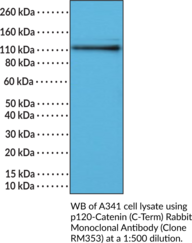Territorial Availability: Available through Bertin Technologies only in France
- Correlated keywords
- p120Catenin Cterm premRNA Nterminal coiledcoil Cterm
- Product Overview:
p120-Catenin is a member of the armadillo repeat domain protein family with roles in cell adhesion and junction maturation, as well as in the regulation of Rho family GTPase activity.{58215} Alternative splicing of CTNND1 pre-mRNA produces 64 isoforms with isoform 1 and 3 most commonly expressed.{58216,58217} p120 isoform 1 is composed of an N-terminal coiled-coil domain, a regulatory domain, an armadillo repeat domain that facilitates cadherin interaction, and a C-terminal tail and is expressed in mesenchymal and non-epithelial cells. p120-Catenin isoform 3 lacks the N-terminal coiled-coil domain and is primarily expressed in epithelial cells.{58216} p120-Catenin is localized in three subcellular pools, a membrane-associated cadherin-bound pool, a cytoplasmic pool that modulates Rho GTPases, and a nuclear pool that associates with the transcriptional repressor Kaiso.{58217} Isoform switching from p120 isoform 3 to isoform 1 is coordinated with the E-cadherin to N-cadherin switch that occurs during epithelial-to-mesenchymal transition (EMT). Loss of CTNND1 expression is positively correlated with disease activity in patients with active Crohn’s disease or ulcerative colitis.{58218} Increased levels of cytoplasmic p120-catenin are correlated with late-stage disease, lymph node metastasis, and reduced survival in patients with colorectal cancer, as well as poor prognosis in patients with lung squamous cell carcinoma and adenocarcinoma.{58215} Cayman’s p120-Catenin (C-Term) Rabbit Monoclonal Antibody can be used for immunohistochemistry (IHC) and Western blot (WB) applications.
Cayman Chemical’s mission is to help make research possible by supplying scientists worldwide with the basic research tools necessary for advancing human and animal health. Our utmost commitment to healthcare researchers is to offer the highest quality products with an affordable pricing policy.
Our scientists are experts in the synthesis, purification, and characterization of biochemicals ranging from small drug-like heterocycles to complex biolipids, fatty acids, and many others. We are also highly skilled in all aspects of assay and antibody development, protein expression, crystallization, and structure determination.
Over the past thirty years, Cayman developed a deep knowledge base in lipid biochemistry, including research involving the arachidonic acid cascade, inositol phosphates, and cannabinoids. This knowledge enabled the production of reagents of exceptional quality for cancer, oxidative injury, epigenetics, neuroscience, inflammation, metabolism, and many additional lines of research.
Our organic and analytical chemists specialize in the rapid development of manufacturing processes and analytical methods to carry out clinical and commercial GMP-API production. Pre-clinical drug discovery efforts are currently underway in the areas of bone restoration and repair, muscular dystrophy, oncology, and inflammation. A separate group of Ph.D.-level scientists are dedicated to offering Hit-to-Lead Discovery and Profiling Services for epigenetic targets. Our knowledgeable chemists can be contracted to perform complete sample analysis for analytes measured by the majority of our assays. We also offer a wide range of analytical services using LC-MS/MS, HPLC, GC, and many other techniques.
Accreditations
ISO/IEC 17025:2005
ISO Guide 34:2009
Cayman is a leader in the field of emerging drugs of abuse, providing high-purity Schedule I-V Controlled Substances to federally-licensed laboratories and qualified academic research institutions for forensic analyses. We are certified by ACLASS Accreditation Services with dual accreditation to ISO/IEC 17025:2005 and ISO Guide 34:2009.





